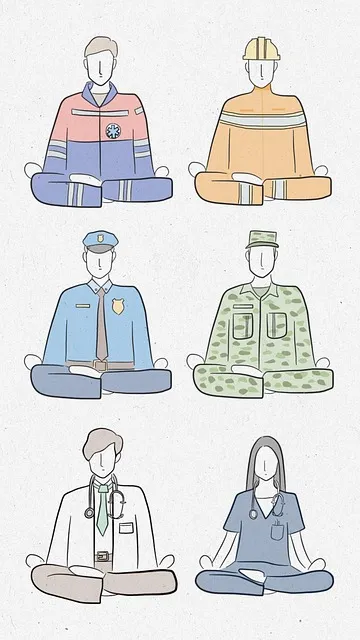The Longmont Kaiser mental health programs recognize the significant influence of media on public perceptions of mental health. They advocate for accurate, sensitive, and diverse media representations to combat stereotypes and reduce stigma. Through comprehensive training for healthcare providers on cultural sensitivity, these programs aim to foster empathy, create inclusive spaces, and enhance emotional healing processes. By challenging outdated portrayals, they promote understanding, empower individuals to take charge of their well-being, and ultimately strive for a more inclusive society where everyone can reach their full potential.
Mental illness representation in media significantly influences public perceptions, often perpetuating harmful stereotypes or, conversely, fostering understanding. This article explores this complex issue through three key lenses: the impact of media portrayal on mental health, current trends in media depiction of mental illness, and successful initiatives like the Longmont Kaiser Mental Health Programs. We also offer strategies to enhance accurate representation and promote empathy while debunking stigma through storytelling.
- Understanding the Impact of Media Portrayal on Mental Health Perceptions
- The Current State: How Media Often Depicts Mental Illness
- Longmont Kaiser Mental Health Programs: A Model for Positive Change
- Strategies to Enhance Accurate Mental Illness Representation in Media
- Fostering Empathy and Debunking Stigma Through Storytelling
Understanding the Impact of Media Portrayal on Mental Health Perceptions

The media plays a significant role in shaping public perceptions about mental health, often influencing how individuals understand and respond to various conditions. Positive representation in the media can foster empathy, reduce stigma, and encourage those struggling with their mental well-being to seek support. Conversely, negative or stereotypical portrayals can perpetuate misconceptions, leading to increased fear, discrimination, and potential barriers to access for affected individuals. This is particularly important as these perceptions significantly impact how people view those living with mental illness, affecting the level of support they receive from their communities and healthcare systems.
Longmont Kaiser mental health programs recognize the power of media in this context, emphasizing the need for accurate, sensitive, and diverse representations. By addressing cultural sensitivity in mental healthcare practice through comprehensive training for healthcare providers, these programs aim to enhance emotional healing processes. Ensuring that media narratives reflect the reality of different experiences and challenges associated with mental illness is a crucial step towards creating an inclusive environment where everyone can access appropriate care and support.
The Current State: How Media Often Depicts Mental Illness

In today’s media landscape, the depiction of mental illness often falls short of reality, perpetuating stereotypes and misconceptions. Many popular portrayals lean on dramatic, sensationalized narratives, focusing on extreme behaviors or tragic outcomes. These representations can contribute to stigma and create a distorted view of mental health struggles for both audiences and creators alike. Often, characters with mental illnesses are shown as inherently flawed or dangerous, ignoring the complex spectrum of experiences that actual individuals face.
Longmont Kaiser mental health programs recognize this challenge and strive to promote positive thinking and empathy-building strategies through various initiatives. By designing inclusive and accurate media content, these programs aim to educate the public about mental health in a nuanced way. This approach encourages understanding and supports those struggling with their mental well-being, challenging outdated portrayals while offering valuable insights into effective mental health education programs.
Longmont Kaiser Mental Health Programs: A Model for Positive Change

The Longmont Kaiser Mental Health Programs stand as a beacon of hope and positive change in the realm of mental wellness representation. These innovative initiatives have revolutionized how we address mental health issues within our communities, offering a comprehensive approach that goes beyond traditional therapy models. By integrating various therapeutic techniques, support groups, and community outreach programs, Longmont Kaiser creates an environment that fosters not just recovery but also self-discovery and confidence boosting.
The success of these programs lies in their holistic nature, addressing not only the symptoms of mental illness but also the underlying causes. Through increased Mental Health Awareness, they empower individuals to take control of their well-being and navigate life’s challenges with resilience. By providing accessible resources and a supportive network, Longmont Kaiser is leading the way in challenging negative stereotypes associated with mental health, paving the path towards a more inclusive and understanding society where everyone can thrive and achieve their full potential.
Strategies to Enhance Accurate Mental Illness Representation in Media

Media plays a pivotal role in shaping societal perceptions, and accurate representation of mental illness is crucial for fostering understanding and reducing stigma. To enhance this, content creators and media houses should collaborate with mental health professionals to ensure authenticity. Incorporating expert consultations during production can help create nuanced narratives that reflect real-life experiences.
The Longmont Kaiser mental health programs offer valuable insights into effective strategies. One key approach is to design Mental Health Education Programs tailored for diverse audiences, considering cultural sensitivity in mental healthcare practice. By doing so, media can cater to a broader spectrum of viewers, promoting inclusive and empathetic storytelling. Additionally, highlighting the importance of self-care practices within these narratives can encourage both audiences and creators to prioritize mental well-being.
Fostering Empathy and Debunking Stigma Through Storytelling

Storytelling has long been a powerful tool for fostering empathy and challenging societal norms. When it comes to mental illness, media narratives play a significant role in shaping public perception. By representing individuals with mental health conditions in a nuanced and authentic light, we can begin to dismantle the stigma that often surrounds these experiences. Longmont Kaiser mental health programs have recognized the impact of storytelling as a means to educate and inspire empathy among their community.
Through compelling narratives, media has the potential to humanize mental illness, showcasing the complexities and challenges faced by those affected. This approach debunks common myths and encourages viewers to understand that mental health struggles are not a reflection of personal weakness but rather a diverse spectrum of experiences. By integrating these stories into public discourse, we can foster a more supportive environment where individuals feel encouraged to seek help and advocate for improved mental health policy analysis and advocacy, as well as access to effective stress reduction methods and trauma support services.
The media’s power to shape public perception of mental illness is undeniable. While current representations often fall short, initiatives like the Longmont Kaiser Mental Health Programs offer a promising model for positive change. By prioritizing accurate and empathetic storytelling, we can foster understanding and debunk stigma surrounding mental health issues. Implementing strategic changes in media portrayal is essential to create a more inclusive and supportive society for those living with mental illness.






